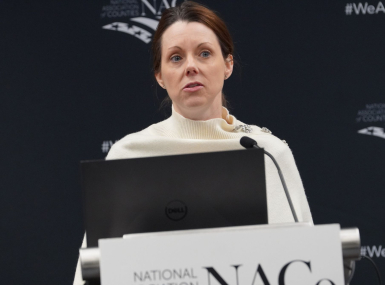County saves $3 for every $1 spent on ‘Durham Connects’ program

Durham County, N.C. healthy baby program provides nurse visits and encourages relationship building with pediatricians to avoid ER visits, saves money
For every dollar invested in its healthy baby program, dubbed “Durham Connects,” Durham County, N.C. not only saves newborns, but dollars as well.
The county saves $3 for every $1 spent, when comparing the costs of the program versus the cost of an average infant ER and hospital stay, according to Ashley Alvord, director of Dissemination & Program Certification.
The program is offered to parents and newborns, providing health checks and other services. Nurses make a first visit when the baby is about three weeks old helping connect parents with community resources to help them raise their baby. Nurses in the program encourage families to create strong relationships with pediatricians and to avoid visiting the ER.
The Durham Connects nurse home-visiting program leads to sharp declines in emergency room visits and health care costs, she said. The American Journal of Public Health noted that infants in the program used 59 percent less emergency care in their first six months of life.
Another study, by Pediatrics, the official journal of the American Academy of Pediatrics, found the program’s benefits continue through the child’s first year, with infants using 50 percent less emergency care than babies not in the program.
The reductions in visits to the ER proved true across several subgroups studied including single-parent families, two-parent families, those on Medicaid and people who were privately insured.
Here’s a comparison of costs:
- Emergency outpatient visit: $423 per visit
- Hospital night stay: $3,722
- Durham Connects program: $700 per family
The program was launched in 2008 by Duke University’s Center for Child and Family Policy in cooperation with the Durham County Health Department and the Center for Child & Family Health.
Six full-time registered nurses currently work in the program and each nurse visits six to eight families per week, Alvord said. About 40 percent of families need a follow-up visit after the initial visit.
“It’s up to each family how much follow-up they need,” she said. Part of the nurse’s job is to connect families with community resources; they can refer them to an array of services at 400 different agencies.
The Center for Child and Family Policy at Duke University estimates that for local governments of similar size, averaging 3,187 births per year, an annual investment of $2.2 million in nurse home visiting would yield community healthcare cost savings of about $6.7 million in the first six months of life, or $3 saved for every $1 spent.
Funding sources for the program include the Duke Endowment, Medicaid reimbursements through Durham County’s Department of Public Health, the Durham County commissioners and the North Carolina Department of Health and Human Services.
In addition to the cost savings, other benefits of the program include lower rates of maternal anxiety, higher quality home environments (safe, clean and free of hazards as well as more age-appropriate books and toys). Parents also showed more positive behaviors and chose higher quality daycare if they chose out of home care.
The program has been replicated in other North Carolina counties including Beaufort, Bertie, Chowan, Hyde, Forsyth and Guilford counties. Similar programs have also taken root in Iowa, Maryland, Oregon’s Bend, Linn and Lincoln counties and in Minnesota’s Cook County.
Attachments
Related News

National Association of Counties Launches Initiative to Strengthen County Human Services Systems
The National Association of Counties (NACo) announces the launch of the Transforming Human Services Initiative, a new effort to help counties modernize benefits administration, integrate service delivery systems and strengthen county capacity to fulfill our responsibility as America’s safety net for children and families.

Congress seeking ‘common-sense solutions’ to unmet mental health needs
Rep. Andrea Salinas (D-Ore.): “Right now, it is too difficult to access providers … and get mental health care in a facility that is the right size and also the appropriate acuity level to meet patients’ needs.”

Federal-level child welfare priorities center on supporting foster youth, families
Child welfare experts outlined current priorities at the federal level, including better supporting foster care youth who age out of the system and recruiting more foster parents, at NACo’s Human Services and Education Policy Steering Committee meeting.
